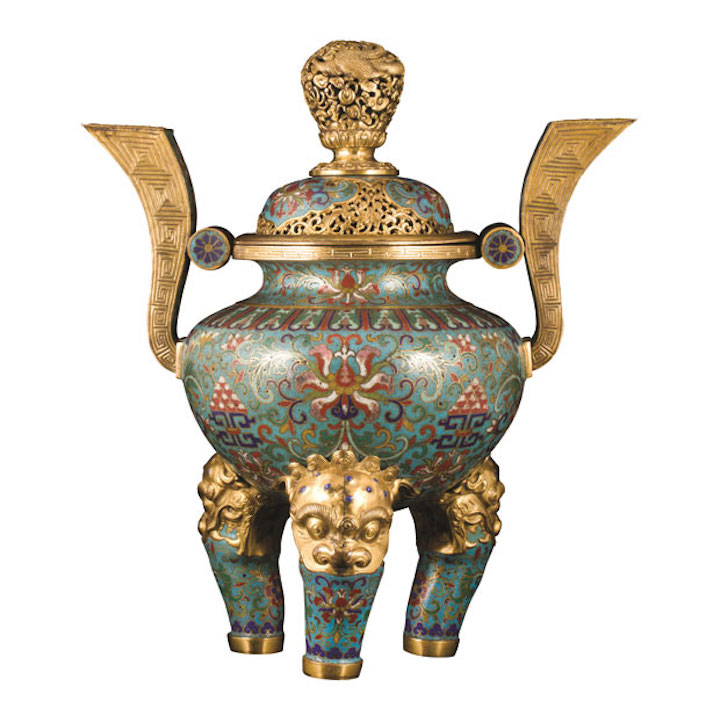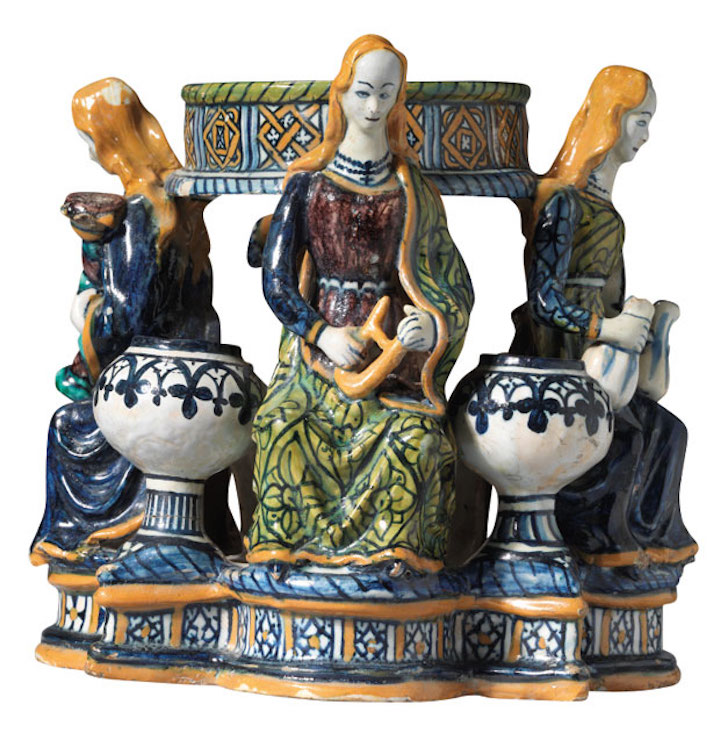Brussels welcomes 62 international dealers to the lively Place du Grand Sablon from 7–11 June. Cultures: The World Arts Fair was launched last year to foster a wider sense of collaboration, but at its heart is a trio of already established events: BRUNEAF, BAAF and AAB. Alongside the remarkable selection of tribal, ancient and Asian art is a special exhibition, ‘Finalité sans Fin’, staged at L’Ancienne Nonciature and featuring many works that have not been on public view.
With 39 exhibitors presenting a diverse range of objects from Africa, Oceania and Indonesia, the section of the fair devoted to tribal art is the most well represented. Galerie Didier Claes hosts a special exhibition of sculptural objects known as bitungwa from the Lega, an ethnic group of the Democratic Republic of the Congo. The abstract figures, often made of ivory or bone, are slender and elegant and, in Lega culture, convey ethical or social values. A wooden Lobi female statue dating to the 19th century can be found at Serge Schoffel, while Alain Lecomte offers a headrest carved in the form of a bat, a totem often seen in sculptures originating in the Tami Islands, Papua New Guinea.

Female figure (19th century), Lobi, Burkina Faso. Serge Schoffel at Cultures: The Worlds Arts Fair
Among the 13 Asian art dealers presenting works from India, China, Japan and Southeast Asia, don’t miss Carlo Cristi, Galerie Lamy and Jacques How Choong. Highlights here include a phyllite carving of Shiva and Parvati dating to the late Pala dynasty (c. 11–12th century), on show at Famarte. The 10 ancient art dealers offer a variety of classical, Egyptian, and Near Eastern antiquities. Galerie Eberwein presents a polychromed wooden Egyptian statue from the 10th or 11th Dynasty, and Galerie Tarantino impresses with a Greek attic vase attributed to the Antimenes Painter, made in around 520 BC.
Tribal art is also the focus in eastern France. The Bourgogne Tribal Show, which takes place in Besanceuil on the private estate of dealer Bruno Mory, welcomes 25 exhibitors specialising in works from Africa, Asia, Oceania and the Americas (25–28 May). Following the success of last year’s edition, a number of new exhibitors have joined the roster, including Jean-Christophe Charbonnier, Jonathan Hope, and David Serra. Didier Claes is also present here, with a remarkable wooden Chokwe mask from the Democratic Republic of the Congo, while Charles-Wesley Hourdé and Galerie Bruno Frey offer a selection of face masks from the Ivory Coast. Unusual sculptural figures from the late 19th/early 20th century can be found at Olivier Larroque and Kapil Jariwala. The latter’s wooden initiation figure from Papua New Guinea depicts a slender female figure (tetepeku) with splayed legs, used as part of the male initiation cycle. The fair also hosts a special two-week exhibition of 30 works on the theme of childhood at nearby Cluny Abbey.
The Hong Kong Exhibition and Convention Centre once again welcomes the International Antiques Fair, now in its 10th edition (26–30 May). This year’s event, which coincides with Asia Week Hong Kong, brings together more than 70 dealers from Asia, Europe and the US. Highlights include a 5th-century bronze bell from the Eastern Zhou dynasty at Galerie Christian Deydier; a tripod gilt bronze and cloisonné enamel censer at Galerie Lamy; and a gilt silver Buddha Shakyamuni at Hollywood Galleries. The fair’s events series also includes an exhibition of Chinese paintings and Japanese lacquer.

Tripod censer, Qing dynasty, Qianlong period (1736–95). Galerie Lamy at the International Antiques Fair
Across the Atlantic, the sixth edition of Frieze New York returns to Randall’s Island Park from 5–7 May. With more than 200 galleries from 30 countries – including first-time exhibitors from Brazil, Guatemala, Japan and Poland – the event promises the best in modern and contemporary art. Curated sections, presentations from emerging galleries (look out for the Frame section), and a vibrant talks programme also expand the scope of the fair. This year’s Spotlight, which looks at seminal moments in art history since 1960, has grown to 31 stands and is curated by the Menil Collection’s Toby Kamps.
Drawing on the Frieze Masters model, Acquavella, Hauser & Wirth and Lévy Gorvy curate stands that engage in a dialogue with modern and contemporary art, while tribal art specialists such as Donald Ellis and Galerie Meyer, participating in the fair for the first time, make reference to the impact tribal art has had on the avant-garde.
Running at the same time as Frieze, Pace and Acquavella join forces to present the thematic two-gallery show ‘Calder/Miró: Constellations’ (20 April–26 May at Acquavella; 20 April–30 June at Pace). Combining 60 sculptures, paintings and works on paper, the two displays draw out the affinities between the two friends, and their approach to a series of works produced in the heat of war and separation. Elsewhere in New York, Brimo de Laroussilhe and Voyageurs & Curieux stage ‘Affinity’, the latest in their series of exhibitions displaying medieval and Oceanic art side by side (2–13 May). The surprising juxtapositions include an enamel on copper gilt plaque depicting St John from the late 12th century alongside a 19th or 20th century charm figure from Papua New Guinea.

Inkstand (c. 1480–90), probably Faenza, maiolica. Sam Fogg, London
In London, Sam Fogg presents ‘Maiolica Before Raphael’, which brings together a set of late medieval and Renaissance ceramics made in Italy between 1275 and 1500 (8 May–16 June). This is the first exhibition in 100 years to focus on this overlooked period of Italian ceramic production, and it takes as its focus the quattrocento and the development of tin-based glaze. More than 40 objects are on show, including a 15th-century inkstand that takes the form of the four cardinal virtues, one of the most ambitious maiolica inkstands known.
Finally, the Scottish Gallery in Edinburgh celebrates its 175th anniversary this May with three new exhibitions, among them ‘Portrait of a Gallery II’ (3 May–3 June). Picking up the story from a successful 2010 show, this second display will provide further insight into both the development of Scottish art and the gallery itself.
From the May issue of Apollo: preview and subscribe here.














![Masterpiece [Re]discovery 2022. Photo: Ben Fisher Photography, courtesy of Masterpiece London](http://zephr.apollo-magazine.com/wp-content/uploads/2022/07/MPL2022_4263.jpg)
‘Like landscape, his objects seem to breathe’: Gordon Baldwin (1932–2025)